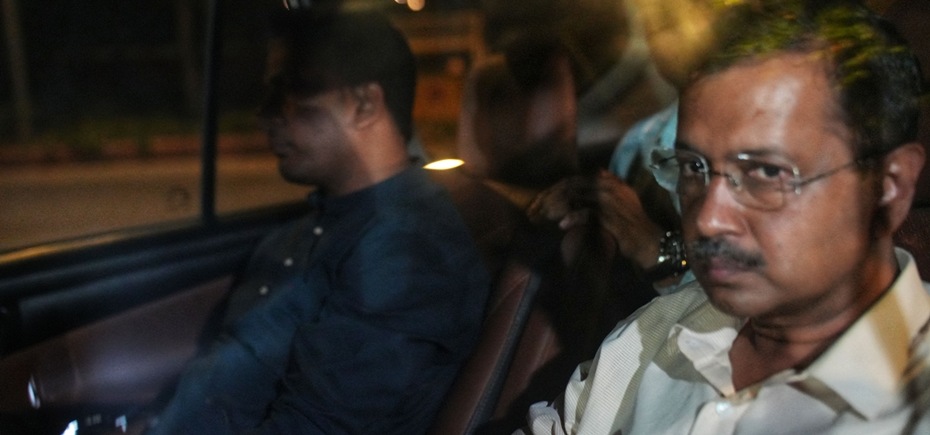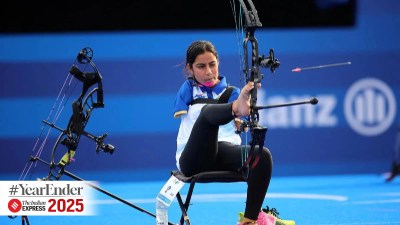ED arrests Delhi CM Arvind Kejriwal days after it linked him to Rs 100 crore kickbacks in excise case
Arvind Kejriwal became the first serving Chief Minister to be arrested, after months of skipping summons by the investigation agency – nine in total – and calling them “illegal”.
 Delhi Chief Minister Arvind Kejriwal being taken away from his residence after his arrest in New Delhi on Thursday. (Express photo: Abhinav Saha)
Delhi Chief Minister Arvind Kejriwal being taken away from his residence after his arrest in New Delhi on Thursday. (Express photo: Abhinav Saha)Arvind Kejriwal, whose campaign against corruption in 2011 birthed the Aam Aadmi Party and paved the way for his ascension as Delhi’s Chief Minister, was arrested by the Enforcement Directorate Thursday night in connection with the Delhi excise policy case
He became the first serving Chief Minister to be arrested, after months of skipping summons by the investigation agency – nine in total – and calling them “illegal”.
His arrest came hours after the Delhi High Court declined to grant Kejriwal interim protection from coercive action by the ED.
The case pertains to alleged kickbacks received by the AAP and its leaders in implementation of the now-scrapped 2021-22 Delhi excise policy.
While Kejriwal is the most high-profile arrest in the case, investigation agencies have also arrested his former deputy Manish Sisodia (in jail since February 2023), party Rajya Sabha MP Sanjay Singh (arrested in October 2023), AAP communication in-charge Vijay Nair (in custody since November 2022) and BRS leader K Kavitha (held last week) in connection with the case.
 Delhi Minister Atishi Singh outside the residence of Delhi Chief Minister Arvind Kejriwal after an ED team arrived there, shortly after the high court refused to grant Kejriwal protection from coercive action in an excise policy-linked money laundering case, in New Delhi, Thursday, March 21, 2024.
Delhi Minister Atishi Singh outside the residence of Delhi Chief Minister Arvind Kejriwal after an ED team arrived there, shortly after the high court refused to grant Kejriwal protection from coercive action in an excise policy-linked money laundering case, in New Delhi, Thursday, March 21, 2024.
Kejriwal’s arrest, which comes five days after the Model Code of Conduct came into force, effectively takes him out of the Lok Sabha campaign. A key INDIA bloc partner, he had been attacking the BJP on issues ranging from the Citizenship (Amendment) Act to the misuse of investigation agencies.
With the ED closing in, Kejriwal had moved the Delhi High Court seeking interim relief from “coercive” action. It was filed as part of his main writ petition challenging the summons issued to him by the ED and the validity of certain provisions of the Prevention of Money Laundering Act.
A division bench of Justice Suresh Kumar Kait and Justice Manoj Jain said it had heard both sides – Kejriwal’s and the ED’s – but was “not inclined” to grant him protection “at this stage”. The bench said the application will be heard on April 22 with the main writ petition.
Shortly after 4 pm, information began to emerge that the ED had sought information from the Delhi Police about security arrangements around the CM’s residence. “Queries included whether there is a rear entry/exit at his Civil Lines home, and how many party workers were present outside,” a senior police officer said.
“Messages were shared with officers of the North district and security wing. Two things were conveyed – that he was at home and that there is a gate in the backyard. A security plan was prepared and higher-ups told personnel not to share information about the raid. Police personnel were asked to reach his house and the Rapid Action Force was called to manage the crowd,” the officer said.
An officer said there had been instances in the past when party workers gathered in large numbers when the ED went to serve summons to Kejriwal, which is why extra caution was taken to ensure the plan remained a secret.
“After all the arrangements were made by the Delhi Police, a message was conveyed that the ED team could come and question the CM,” the officer said.
“Following questioning, the ED team decided to arrest Kejriwal after seeking legal opinion,” the officer said.
In a statement later, AAP minister Saurabh Bharadwaj said, “Every corner of the CM’s residence was searched, and the ED got Rs 70,000 in cash, which it returned.”
Outside, the crowd had been swelling. With hundreds of party workers and MLAs blocking the entry and exit points from Kejriwal’s home, the ED, despite arresting Kejriwal at 9 pm, could not take him out of his house for another two hours.
Dozens of protesters, including MLAs Rakhi Bidlan, Sanjeev Jha and Jarnail Singh, were detained. Also in the crowd were Delhi Congress chief Arvinder Singh Lovely and senior leader Sandeep Dikshit. The AAP and Congress have tied up in the national capital. “We are firmly with our alliance partner. This arrest is blatant and unconstitutional,” Lovely said.
The AAP, meanwhile, decided to knock on the Supreme Court doors – its legal team rushed to the Registrar’s home – hoping for a late-night hearing. The top court, however, said it would hear the matter on Friday.
With its founder and chief arrested, the AAP said Kejriwal “is and will remain Chief Minister”. “He will not resign,” said party leader and Delhi minister Atishi.
Punjab Chief Minister, AAP’s Bhagwant Mann, in a post on social media, said, “The BJP’s political team (ED) cannot arrest Kejriwal’s ideology… because only AAP can stop BJP. Ideology can never be suppressed.”
At a press conference a little before midnight, AAP minister Gopal Rai said, “If Arvind Kejriwal can be arrested, anyone can be arrested. BJP is scared of losing the polls – it will come down from 400 to 40 seats.” The party asked its workers to head home for the night, and gather at the party office on Friday morning.
While Kejriwal was not named in the FIRs registered by the ED or the CBI in the Delhi excise policy case, his name first found a mention in the ED’s chargesheet wherein the agency claimed that he allegedly spoke to one of the main accused, Sameer Mahendru, in a video call and asked him to continue working with co-accused Vijay Nair.
The second reference to Kejriwal was made in a press release issued by the ED on Monday, wherein it called him a “conspirator” in the case. This followed the arrest of K Kavitha, a BRS leader and daughter of former Telangana CM K Chandrashekar Rao, in the case. The ED has alleged Kavitha is part of the “South group” that paid money to get undue benefits under the now-scrapped policy.
“ED investigation revealed that Kavitha along with others conspired with the top leaders of AAP including Arvind Kejriwal and Manish Sisodia for getting favours in the Delhi Excise policy formulation and implementation. In exchange for these favours, she was involved in paying Rs 100 crore to the leaders of AAP,” the ED alleged.
– With Malavika Prasad







